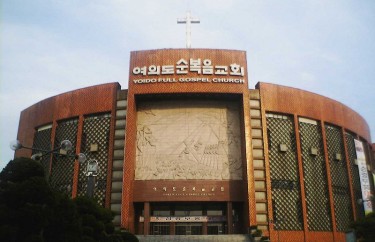In South Korea, an embezzlement case involving the country's largest church has fueled public debate online. Citizens, pointing out the Korean Protestant church's corruption and its neglect of public duties, have even suggested lifting the tax exemption granted to churches.
Korea is not a Christian nation, neither historically nor demographically, but the religion's influence can be felt everywhere. Two presidents – one current – were church elders, celebrities frequently talk about their church experiences and when you climb up to the observatory on Namsan mountain at the heart of capital Seoul, red neon crosses can be seen on every corner, an eerie scene which shocks quite a lots of foreigners and artists.
Some of the world's largest churches are in Seoul, where you can easily find ‘mega-churches’ that have more than 10,000 regular attendees packing their colossal buildings every Sunday. South Korea is numbered as one of the most Christian countries in East Asia with 8.8 million Protestants and 5.1 Catholics.
Turning away
Over the recent decade, however, the number of Protestants has made a sharp downturn [ko] from 8.8 million to 8.6 million people. Christianity is becoming more unpopular as it is seen to be becoming more powerful and greedy. Wealthy pastors have lost credibility over appropriating vast amounts of church money for personal use, ramming church construction bills without their congregations’ genuine consent and forcing their attendees to cover the astronomical costs of building bigger, fancier facilities.
Numerous people, especially the younger generation, have also turned away from Christianity after several pastors faced criminal charges over sexual assault and prominent churches became extremely partisan in favor of the ruling political party.

Image of the Yoido Full Gospel Church in Seoul, Image taken by Puzzlet Chung, Wikimedia Commons, Public Domain
Prosecutors launched an investigation last week into Reverend Cho Yong-gi, the founder of the Yoido Full Gospel Church in Seoul. His church elders accused Cho of allegedly siphoning off donations worth about 23 billion Korean won (USD 20 million) to save his son from tremendous losses he made in stock investments.
Cho, 75, is a legendary figure in South Korean church history. He founded Yoido Full Gospel Church in 1958 and grew it into the largest Pentecostal Christian in South Korea and the world, with about 1 million church members (2007). Cho denounced the allegation as a smear campaign, but it has already damaged his reputation beyond repair.
Financial controversies
The total revenue of Korean Protestant churches is believed to exceed [ko] 400 billion Korean Won (USD 340 million). Wiki Tree, South Korea's online citizen news outlet, commented [ko] that if only a few church leaders make decisions on how this tremendous amount of money is spent so no one can guarantee its transparency, and that there is a chance money will not only corrupt the churches, but corrupt Korean society. Another news report revealed [ko] that only 3 percent of the money is used to help those financially less fortunate.
In many countries, churches qualify for tax-exempt status, as law treats them as organizations with purpose of serving the public good. Many Koreans argue that since large churches’ main focus is on building new, bigger facilities, clearly serving private interests, tax exemption should be lifted. A handful of church defenders have emphasized that the proportion of church spending on relief and volunteer works are much greater than those of other non-profit organizations.
Namil Jo responded [ko] to such claims:
네네. 5%아니 10% 아니 15% 쓴다고 합시다 그럼 나머지는?…님은 십일조 그게 어찌 사용 되는지 아시나요? 전 알고서 천주교로 갔습니다.
Lim Won-ik, who introduced himself a Christian but not a church-goer (@yim0517) tweeted [ko] :
교회에 세금을 물린다면 소수(?)빼놓고 많은 사람들에게 사랑받는 종교가 될것이다.존경받는 목사들도 많아질테고…종국에는 쇠락하는 기독교에 활력을 불어넣는 수단이 될수도 있을거다.
Twitter user @therapyoil tweeted [ko]:
교회는 세금을 내면 안되는 이유라도 있는 것이냐? 세무감사 당하기 두려운게지. 하느님은 두렵지 않고!
Twitter user @crockdail70 voiced [ko] worries that some wealthy pastors cases may smear reputation of good Christians:
대형교회 일부 쓰레기 목사넘들 때문에 신자들도 도매금으로 넘어가는게 안타깝다 교회도 세금을 내야 저런 쓰레기들이 안나타나지.
A net user ID: 연못골 urged [ko] corrupted pastors to step down and the authority to tax big churches whose attendees surpass 10,000. This post received more than 750 comments in Daum Agora, South Korea's biggest public forum:
어렵사리 살아가면서 감사하는 마음으로 살아가는 숱한 성도들의 피와땀이어린 헌금을 값진곳에 쓰기보다는 목회자의 개인쌈짓돈마냥쓴다는것은 정상적인 목회자의 모습이 아니다. 그러한 목회자들이 한국교회에서 대형교회의 목회자로 있다는것또한 한국교회의 불행이라고 밖에 달리 볼길이 없다. 정직한 마음과 열정어린 헌신으로 사역하는 다수 목회자들과 또한 삶의 현장에서 묵묵히 땀을 흘리면서 벌은돈으로 헌금을 내는 다수 성도들을 위해서라도.. 비리목회자는 강단에서 물러나기를 강력히 요청하는 바이다. 몇몇 대형교회 목회자들의 비리는.. 한국교회의 수치이다.







7 comments
i am tariq shakar in lahore i am runing a christian channel. this channel is tele cast 24 hours. this channel has been in working for five years. 70 to 80 thousand family members are watching this christian channel on the behalp of this channel a prayer convertion is held on 2nd friday of every mouth. i wish that you also send me yopur holy message so that i convly that to the charistian people througt this channel. may god blees you and your family and be you shield and pratecter. your well wisher tariq shakar